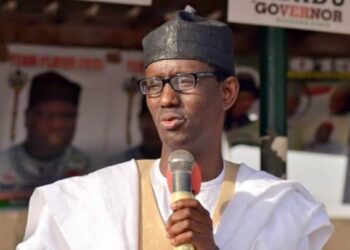Advocate fiscal restructuring plan ‘FG to refund states on roads maintenance, others’
By Abdullahi M. Gulloma,
Abuja
The N999.5 billion bailout given to states in the early life of President Muhammadu Buhari’s administration, is far from solving the challenges faced by the second tier of government, as governors still cry out over their inability to pay workers salaries.
This development has remained a source of concern to the president who said, he is greatly disturbed over the consequence of this insolvency on the state civil servants, their families and dependants.
He expressed his dismay during a meeting with governors under their umbrella body- the Nigeria Governors Forum (NGF), at the Presidential Villa, in Abuja, yesterday.
Between July last year and now, President Buhari had, at different times approved the sum of N999.5billion to the states as bailout , to among other things, settle the backlog of their workers’ salaries.
According to records, the Federal Government first released N713.7billion intervention funds as bailout which was part of a three-pronged relief package meant to end the workers’ plight. In the package are N413.7billion special intervention funds and the balance of about N250billion to N300billion, given as soft loan to states.
Also, N413.7b( $2.1b) was sourced from the Liquefied Natural Gas proceeds and the remaining N300b was a Central Bank of Nigeria-packaged special intervention fund.
While this was on, the Debt Management Office(DMO) restructured over N660billion commercial loans owned by the states.
And just last week, the Minister of Finance, Mrs Kemi Adeosun , said the deductions of this loan would still be put on hold to enable the states meet their fiscal obligations.
According to Adeosun, “with the development, President Buhari has stopped deductions from monthly allocations to states at source. Instead, the Federal Government will use its influence to guarantee the elongation of the loans for the benefit of the states.”
While all of these measures do not appear to be solving their problems, the president yesterday told the governors that the federal government would further strive to make more funds available to the states.
This time, he said, his administration would expedite action on refunds due to them for the maintenance of federal roads and other expenses incurred on behalf of the central government in order to ameliorate the hardship being faced by workers.
Besides, the President said government would establish an inter-ministerial committee to study a fiscal restructuring plan for the federation which was presented to him by the governors.
He said the committee would review the plan to improve the finances of state governments and make recommendations on how proposals in the plan should be dealt with by the Presidency, the Federal Executive Council and the National Assembly through legislation.
The President urged governors to understand that while he was ready to do all within his powers to help the states overcome their current financial challenges, the federal government also has funding problems of its own to contend with.
“You all know the problems we have found ourselves in. You have to bear with us,” he said.
Speaking at the meeting, Chairman of the NGF, Governor Abdulaziz Yari of Zamfara state and Governor Nasir El-Rufai of Kaduna state, who chaired the committee that worked on the fiscal restructuring plan, pleaded with the federal government to do more to help the states financially.
The governors told the President that while they had resolved to take other measures to boost their Internally-Generated Revenue, the implementation of the fiscal restructuring plan would help them deal with their funding problems on short, medium and long-term basis.
According to the governors, if the plan was adopted and implemented by the federal government, states of the federation would become more financially empowered to fulfil their constitutional responsibilities.
Governor Yari also told journalists after the meeting that it’s important for the federal government to assist states to meet their constitutional obligations because “everything comes from the state, the oil, agricultural produce, mining and people are in the states.”
“We are closer to the people and have many challenges in the states. Today we have received support from the Federal Government in terms of bailout, restructuring of our debts, giving us 15% of the Excess Crude Account for development.



